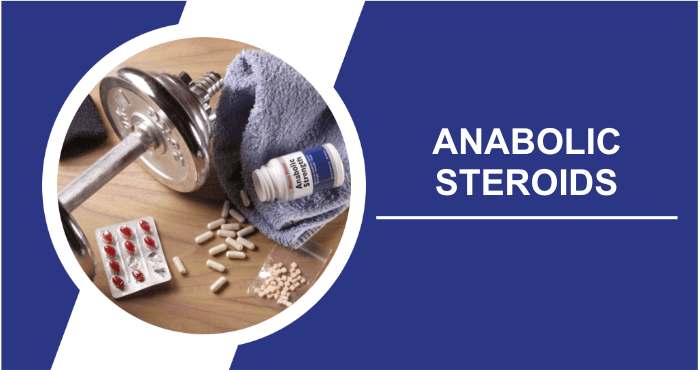When you think of testosterone, what comes to mind- sex drive and the voice deepening? Or maybe facial hair and sperm production. Whatever it is you link testosterone with, it’s safe to say that it contributes immensely to male body development including muscle strength and mass. Although athletes choose to take a type of steroid known as anabolic steroids, to boost muscle mass and enhance performance, testosterone is the real anabolic steroid which the body produces naturally.
So what exactly is testosterone? Is it classified as a steroid? If so, what are the implications of its use? We are on the verge of clarifying what testosterone is and its central role in men’s health. Let’s get into the details!
Is Testosterone A Steroid?
Testosterone is not considered a steroid although it is commonly categorized as a steroid hormone. The distinction lies in their compositions and roles. Testosterone is a hormone that occurs naturally primarily produced in the testes (in males) and to an extent in the ovaries (, in females).
It plays a crucial role in muscle development, bone health and sexual characteristics. On the other hand, steroids, such as corticosteroids or anabolic steroids, are synthetic compounds used for various medical and muscle-building purposes. Although both affect the body, they have different origins, functions and uses.
What Are Hormones In General?
Hormones act as the bodys messengers working behind the scenes to coordinate the various functions of our body. They function like conductors in an orchestra overseeing everything from our emotions and metabolism, to growth and reproduction.
These tiny chemical messengers are produced by various glands in our bodies and travel through the bloodstream to target cells and tissues, where they trigger specific responses. It’s as if they were passing secret notes to keep the body in harmony, making sure all the players play their parts perfectly. Without hormones, our bodies would be like a chaotic orchestra without a conductor, struggling to create the beautiful music of life.
What Is Testosterone?
Testosterone, the hormone that determines male characteristics, is produced in the testes. It plays a role in the development of features like facial hair and a deep voice. It’s worth mentioning that women also have testosterone in their bodies in smaller amounts. In females, testosterone is generated by the ovaries. It helps enhance muscle and bone strength while also contributing to sexual desire.
Before puberty, males and females have relatively similar levels of testosterone. However, during puberty, testosterone levels increase significantly in males, but more modestly in females. In men, the minimum healthy testosterone level is about 300 nanograms per deciliter (ng/dL), but it can peak at 1080 ng/dL between the ages of 18 and 20 and gradually decline over the years without external intervention.
On the hand women generally have significantly lower levels of testosterone ranging from only 15 to 70 ng/dL. Even the lowest levels of testosterone in women are more than four times lower compared to men. To sum it up while testosterone is considered a steroid based on its structure it plays a vital and essential role, in maintaining overall health. From a standpoint steroids are compounds that consist of four fused rings containing a total of 17 carbons.
What Is The Function Of Testosterone?
Testosterone is one of a class of hormones known as androgens. This group of steroid hormones interacts with androgen receptors in the body to stimulate various processes, including protein synthesis. During puberty, testosterone levels increase significantly, especially in males.
Testosterone has an impact on the beginning and advancement of male adolescence as well as the formation and upkeep of male specific attributes. Its main purpose is to activate and support traits in the male physique. A few noteworthy examples of these traits include:
- Broadening of the shoulders
- Increase in muscle mass
- Penis enlargement
- Growth of body hair
- Deepening of the voice
- Increased sexual desire
Other Than Testosterone, What Can I Do For My Hormone Balance?
Ensuring optimal hormone balance goes beyond solely considering testosterone levels. Taking an approach to hormone health involves making lifestyle choices like exercising regularly following a well balanced and nutritious diet and effectively managing stress through relaxation techniques or mindfulness practices. Giving importance to getting quality sleep is also vital since its, during sleep that our bodies undergo repair and regulate hormone production.
Avoiding harmful habits such as excessive alcohol consumption and smoking can also help to improve hormone balance. Remember, it’s about taking care of your body as a whole, creating a harmonious environment where all your hormones can work in sync to support your overall wellbeing.
Is Testosterone A Steroid?
Indeed testosterone can be classified as a steroid. As previously stated steroids are characterized by their chemical structure consisting of four interconnected carbon rings. This classification encompasses natural hormones, including estrogen, the hormone associated with female sex characteristics. Therefore testosterone falls within the realm of steroids. However it is crucial to emphasize that occurring testosterone, in the body is not an illicit anabolic steroid. I will delve further into this topic shortly.
Is Testosterone Anabolic And What Does That Mean?
The term “anabolic” refers to a substance or process that promotes tissue growth, including the development of muscle tissue, as opposed to “catabolic,” which refers to the breakdown of tissue. Testosterone is, therefore, unquestionably anabolic. As testosterone is a steroid, it can be classified as an anabolic steroid.
However it’s important to mention that in conversations the term “anabolic steroid” often refers to illegal substances (which testosterone is not) and the misuse of such steroids. This difference can occasionally lead to confusion. Lets provide more clarification, on the terminology below.
What Exactly Is An Anabolic Steroid?
Now that we’ve discussed the meaning of testosterone it’s crucial for us to have an understanding of steroids. When it comes to misusing fitness terminology the word “steroid” undoubtedly ranks high on the list. Among the public the terms “steroids” or “anabolic steroids” are commonly used to refer to any illegal substances consumed by individuals who use steroids with the aim of improving their sports performance and physical appearance.
While this loose terminology may be sufficient for casual conversation, it does not accurately capture the essence of steroids, anabolic steroids, or their legitimate health-related use. To begin with, the term “steroid” refers to specific compounds that have a particular molecular structure. As previously mentioned, it refers to compounds with a carbon skeleton consisting of four interconnected carbon rings, for a total of 17 carbon atoms.
Nowadays, when we talk about “anabolic,” we are referring to a process or substance that helps in the growth of our body tissues. That’s why compounds like HGH and testosterone are categorized as anabolic because they play a role in promoting growth. However, this is where things get confusing. The problem lies in the fact that these terms are often misused, and incorrect usage has become quite common.
Therefore, it is essential to distinguish between the precise medical definitions and how these terms are used colloquially. In the medical context, testosterone is considered an anabolic steroid because it has steroidal properties and promotes muscle growth. However, when people generally refer to “anabolic steroids,” they are usually referring to illegal substances used to improve body composition, muscle development,, and performance.
This group encompasses substances that when examined from a perspective do not strictly align with the steroid category. Take HGH as an example. While it is frequently labeled as an anabolic steroid it is actually a hormone rather than a steroid even though it possesses anabolic characteristics. Similarly Erythropoietin (EPO) a hormone, for stimulating red blood cell production is often categorized as an anabolic steroid as well.
It should also be noted that testosterone occurs naturally, but can also be produced synthetically. Its synthetic form may be used as a medical therapy or may be obtained illicitly. Thus, its classification (whether by medical definition or colloquial interpretation) depends on its source and intended use.
Is Testosterone A Steroid Or A Hormone?
This raises the question: Is testosterone classified as a steroid or a hormone? Before we get the answer, let’s take a moment to consider that the question is not entirely accurate. What we should actually be asking is: Is testosterone an anabolic steroid or simply a hormone? The answer to this query varies depending on its source.
When it is naturally synthesised in the body, testosterone is considered a steroid hormone. Conversely, if it’s synthetically produced outside the body for medicinal purposes, it falls into the category of an anabolic steroid. However, it’s important to note that being classified as an anabolic steroid does not automatically make testosterone therapy illegal.
What Sports Can Increase Testosterone Levels?
Engaging in sports and physical activities has the potential to enhance testosterone levels. Resistance training, such as bodyweight exercises, can significantly influence testosterone production. These demanding workouts that focus on building muscle send signals to your body to release more of this hormone. Likewise, incorporating high-intensity interval training (HIIT) into your routine can be a way to temporarily increase testosterone levels.
Competitive sports such as sprinting, wrestling, and martial arts, which require short bursts of intense effort, offer similar benefits. However, it’s important to remember that consistency is critical; maintaining an active lifestyle and combining these activities with a balanced diet and adequate sleep is the key to maintaining healthy testosterone levels in the long term.
What Happens When Testosterone Levels Are Low?
As mentioned earlier the levels of testosterone reach their peak between the ages of 18 and 20¹ after puberty when the body experiences a surge of hormones. However it is worth noting that these optimal testosterone levels may be enjoyed during this period because as you enter your 20s after turning 18 your bodys natural production of testosterone starts to decrease. This decline in testosterone can happen due to two factors; as a natural part of the aging process and, as a consequence of lifestyle decisions.
As far as ageing is concerned, there is little that can be done to prevent it. As we age, our bodies inevitably begin to break down, and this is simply the natural course of life. Unfortunately, many men attribute their low testosterone levels to ‘ageing’, when in fact it is their lifestyle choices that have the most significant impact on their T levels. Failure to maintain healthy testosterone levels can lead to several health risks, some of which are quite serious. These can include
- Reduced libido
- Erectile dysfunction
- Problems maintaining muscle mass and strength
- Decreased muscle mass and strength
- Weight gain
- Fatigue and low energy
- Depression and other mood changes
How Can Testosterone Levels Be Increased?
As mentioned previously men nowadays are facing a decrease in testosterone levels due, to their lifestyle choices and environmental factors. There are common factors that contribute to this decline, including:
- Smoking
- Excessive alcohol consumption
- Sedentary lifestyle
- Obesity
- Poor diet
- Lack of sleep
- Use of narcotics (prescription painkillers)
- Medication for hair loss
If these factors are responsible for your declining testosterone levels, it makes sense to reverse these behaviors to restore testosterone levels to a healthy range. For example, a 2014 study found that testosterone levels in sedentary men increased significantly after a 12-week exercise program. Similarly, research has shown that men who were overweight or obese experienced the most significant improvements in testosterone levels after diet and exercise interventions.
Similar positive effects have been seen with improvements in sleep quality and smoking cessation. Therefore, key lifestyle changes to support your T levels include establishing an effective exercise routine, sticking to a weight loss diet plan, eliminating harmful habits such as smoking and excessive alcohol consumption, and prioritizing quality sleep. In addition to lifestyle changes, you can also boost your testosterone levels by using testosterone boosters and TRT or, in our opinion, the best online TRT, Fountain TRT.
Testosterone boosters are supplements that help enhance testosterone levels by incorporating vitamins, minerals, and herbs. Unlike TRT, which is a medical procedure involving the administration of synthetic testosterone in low doses to men, low testosterone levels are typically done on a weekly basis with the goal of elevating overall testosterone levels.
Are Testosteron Boosters Steroids?
It’s crucial to understand that testosterone boosters are distinct from steroids and should not be grouped. The finest testosterone boosters solely consist of vitamins, herbs, and minerals that can enhance testosterone levels within your body’s range. Moreover, you can purchase testosterone boosters without a prescription since they only contain ingredients. There is no need for a prescription when it comes to testosterone boosters.
Steroids Vs. Testosterone – Key Differences
Let’s review the main differences between testosterone and steroids:
- Nature: Testosterone is a naturally occurring compound, whereas anabolic steroids are synthetic in nature.
- Purpose: Anabolic steroids are designed to mimic the effects of testosterone.
- Testosterone levels: Natural testosterone levels in the body are naturally limited to a specific range, whereas anabolic steroids can raise these levels significantly above this range.
- Impact on hormones: Anabolic steroids can suppress the body’s natural production of testosterone, thereby affecting overall hormone levels.
Who Should Consider Boosting Their Testosterone Levels?
Now that we’ve established the characteristics of testosterone and the reasons for considering supplementation, a common question arises: Who should think about enhancing their testosterone levels? Individuals who are 25 years old or older and have been diagnosed with levels of testosterone should consider increasing their T levels. This can be achieved through the use of testosterone boosters or by undergoing testosterone replacement therapy (TRT). If you suspect that you have low T, it is recommended to consult a healthcare professional first and undergo a test to evaluate your testosterone levels.
What Are The Most Effective Ways To Increase Testosterone?
Once you’ve confirmed that you have low T, you can decide whether to start with a testosterone booster, which involves taking a pill to naturally increase your testosterone levels, or talk to your doctor about starting TRT. In addition to considering one of these approaches, it is important to make lifestyle changes. This includes eliminating harmful habits, such as smoking, and improving sleep quality, while adopting positive habits, such as regular exercise, a balanced diet, and making sure you get enough restorative sleep.
Frequently Asked Questions
What is testosterone?
Testosterone is a steroid hormone that occurs naturally and is produced in the testes for males and ovaries for females. It has an impact on the development of secondary sexual characteristics, in both genders.
Is testosterone a form of steroid?
In fact, because of its structural similarity to other organic compounds recognised as steroids, testosterone falls into the category of steroids.
In what ways does natural testosterone contrast with synthetic anabolic steroids?
The human body naturally produces testosterone, which plays a role in various essential functions. On the other hand, synthetic anabolic steroids are artificial substances created to improve performance but can have negative effects.
What are the potential hazards associated with the utilization of synthetic anabolic steroids?
The abuse of synthetic anabolic steroids can lead to significant health risks, including cardiovascular complications, liver damage and psychological problems.
Is the usage of testosterone for performance enhancement both lawful and secure?
No, it is illegal. Poses considerable health risks to use testosterone or other steroids for purposes of enhancing performance outside of legitimate medical treatment. These substances must be only utilized under the supervision of professionals when there is a legitimate medical need.
Wrap Up
The debate surrounding testosterone and steroids can be clouded by the negative stigma attached to illegal steroid use. Words are often used in a pejorative way, leading to confusion. In fact, testosterone is a naturally synthesized steroid that serves as the primary male sex hormone. It can also be manufactured artificially and administered under proper medical supervision by a qualified healthcare provider.
We should bear in mind that the term “steroids” has been negatively affected by the misuse of steroids and problems like “roid rage”. However when we talk about the production of steroids, in our bodies or their legitimate medical applications it shouldn’t have a negative association.
Sources
- American Urological Association. “Testosterone Deficiency Guideline.” Read more
- Birthi, P., Nagar, V. R., Nickerson, R., & Sloan, P. A. (2015). “Hypogonadism associated with long-term opioid therapy: A systematic review.” Journal of opioid management. Read more
- Wittert G. (2014). “The relationship between sleep disorders and testosterone.” Current opinion in endocrinology, diabetes, and obesity. Read more
- Sharma, R., Harlev, A., Agarwal, A., & Esteves, S. C. (2016). “Cigarette Smoking and Semen Quality: A New Meta-analysis Examining the Effect of the 2010 World Health Organization Laboratory Methods for the Examination of Human Semen.” European urology. Read more
Mark Willson, holding a Ph.D., functions as a psychotherapist in Washington, D.C. His specialized fields encompass addiction, anxiety, depression, as well as sexuality and interpersonal connections. Dr. Willson holds the distinction of being a diplomat for the American Board of Addiction and Anxiety, further serving as a certified counselor and addiction specialist.
Aside from his personal professional endeavors, Dr. Wilson has engaged in roles as an author, journalist, and creator within substantial medical documentary projects.
Isabella Clark, Ph.D., held the position of a professor within Emory University’s School of Medicine, working in the Department of Mental Health and Nutrition Science. Alongside this role, she served as a research associate affiliated with the National Research Center. Dr. Clark’s primary area of research centers on comprehending the mechanisms through which adverse social encounters, encompassing prolonged stress and traumatic exposure, contribute to a spectrum of detrimental mental health consequences and coexisting physical ailments like obesity. Her specific focus lies in unraveling the reasons behind the varying elevated susceptibility to stress-linked disorders between different genders.






